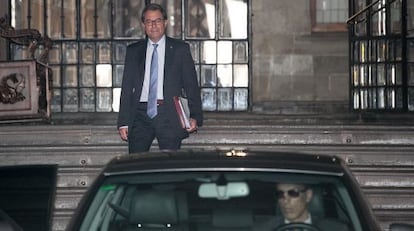Catalan parties planning to declare independence after election win
Details have emerged of pact between Convergence (CDC) and the Catalan Republican Left The groups are planning on running together at September’s regional elections

If secessionist parties win the Catalan regional elections scheduled for September 27, independence could be formally declared six to eight months later.
That is part of the deal that was reached this week by Democratic Convergence of Catalonia (CDC) and the Catalan Republican Left (ERC), which have decided to run together on a joint pro-sovereignty ticket.
If such a moment arrives, it will mark a “disconnect” or “breaking point” with Spain, according to sources familiar with the negotiation.
This will either go well, very well or not that well, but that decision is now up to the Catalan people”
Catalan premier Artur Mas
Ever since Catalonia held an informal referendum on independence in November of last year, surveys have been showing a steady decline in support for the region’s secession from Spain. A December poll by the Catalan executive’s Opinion Studies Center (CEO) showed that 44.5 percent of citizens would vote yes to the question: “Would you like Catalonia to become an independent state?” compared with 49.4 percent in October.
Now, both parties hope to drum up renewed enthusiasm for secession through their joint action. The deal between CDC and ERC backtracks on an earlier agreement reached in January that both parties would run separately in the regional elections, partly due to their recurring disagreements on a number of issues.

Following the meeting that clinched the deal, Catalan premier Artur Mas stated that the time has come “to really roll up our sleeves and move beyond esthetic comfort [...] This will either go well, very well or not that well, but that decision is now up to the Catalan people,” Anna Estañol reports.
Although the September ballot is not formally meant as a new referendum on independence, pro-sovereignty leaders are viewing it as such.
Following Monday’s decision, ERC issued a statement asserting that the elections are “clearly plebiscitary” and noted that its deal with CDC sets out specific steps to take after the vote in order to begin creating “a new state and building a new country that is more clean and more fair.”
An uncomfortable alliance?
But despite the show of unity, mutual trust among secessionists is a thing of the past. The Catalan republicans, in particular, are privately viewing the alliance with CDC with more resignation than enthusiasm. As recently as July 11, Junqueras was supporting a pro-independence electoral list with no career politicians on it, as the best way to win the September 27 elections.
“A list without politicians is the best way to prove that the elections are really a plebiscite on independence,” he said then.
Until now, CDC’s natural partner had been the Democratic Union of Catalonia (UDC). Together, the CiU coalition ruled Catalonia almost uninterruptedly for 37 years, first under longtime premier Jordi Pujol, then, since 2010, under current premier Artur Mas.
But last month, the partners announced that they were breaking up, chiefly because UDC refused to support the Catalan independence project any longer. Although both parties share a nationalist vision of Catalonia, UDC holds more moderate views that fall short of independence.
Under the new deal, Mas would run fourth on the CDC-ERC list but is guaranteed a new term as regional premier in the event of victory at the polls. The first three spots are reserved for independent candidates.
ERC leader Oriol Junqueras would run in fifth position, but his party stands to get key departments, including those dealing with the so-called “state structures” required to create a full-fledged Catalan state.
English version by Susana Urra.
Tu suscripción se está usando en otro dispositivo
¿Quieres añadir otro usuario a tu suscripción?
Si continúas leyendo en este dispositivo, no se podrá leer en el otro.
FlechaTu suscripción se está usando en otro dispositivo y solo puedes acceder a EL PAÍS desde un dispositivo a la vez.
Si quieres compartir tu cuenta, cambia tu suscripción a la modalidad Premium, así podrás añadir otro usuario. Cada uno accederá con su propia cuenta de email, lo que os permitirá personalizar vuestra experiencia en EL PAÍS.
En el caso de no saber quién está usando tu cuenta, te recomendamos cambiar tu contraseña aquí.
Si decides continuar compartiendo tu cuenta, este mensaje se mostrará en tu dispositivo y en el de la otra persona que está usando tu cuenta de forma indefinida, afectando a tu experiencia de lectura. Puedes consultar aquí los términos y condiciones de la suscripción digital.








































